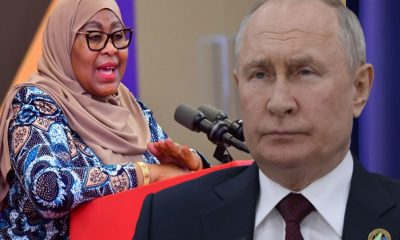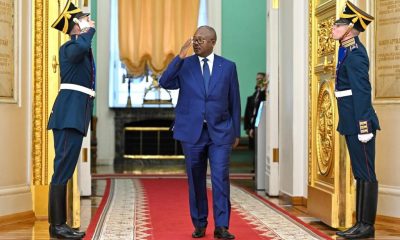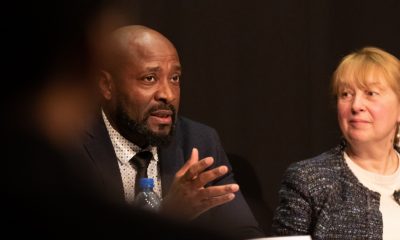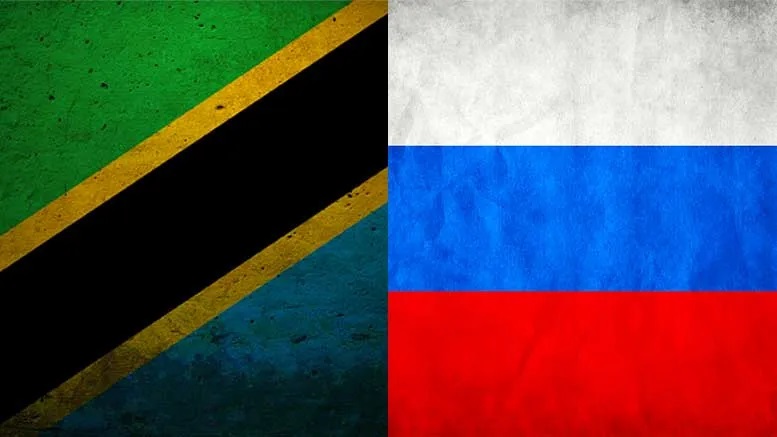World
A Window Opens in Business Ties Between Russia, Nigeria
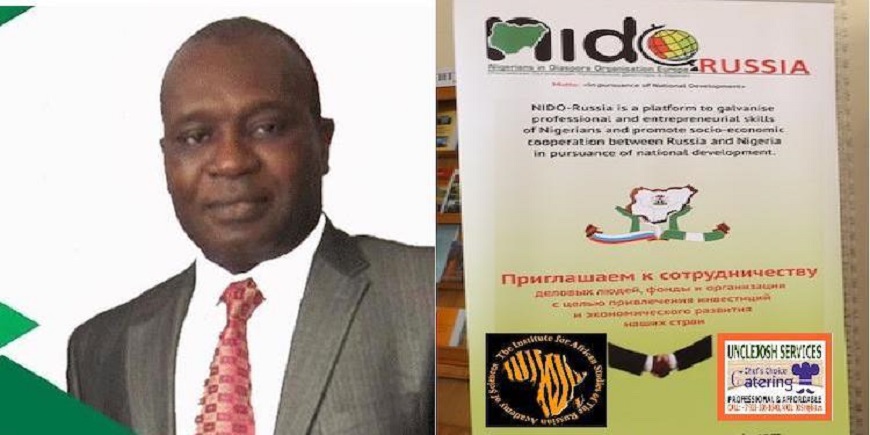
By Kester Kenn Klomegah
As part of efforts to connect Russia with Nigeria and to lure potential Russian investors and business people to Nigeria and vice versa, a business lecture platform Doing Business with Nigeria has been created in November.
Its primary aim is to get the Russian business community to understand the economic and investment potentials as well as the current market conditions in Nigeria.
In a brief interview, Dr Rex Essenowo, Chairman of the Russian Chapter of Nigerians in Diaspora Organization in Europe (NIDOE) and a member of the Board of Trustees, talks about the first business lecture held late November and the future perspectives of overall Nigeria-Russian economic cooperation to IDN’s Kester Kenn Klomegah. Here are the interview excerpts:
As an insider, do you consider the business lecture on Russia and Nigeria important?
First and foremost, the lecture was a critical action and a call to active duty for Russian companies that participated in the event, as it gave the inside-out of both the political economy of the Nigerian state, as well as presentation of complex market research that is very strategic for potential investors and business people from Russia.
On the other hand, we plan to systematize as an online auditorium based in furtherance of developing bilateral economic relationship between the two countries. We strongly believe that our economic diplomacy and partnerships could be raised to appreciably new levels and it is cost-effective for us.
Obviously, there has been poor or inadequate information on the vast investment opportunities in both great countries and it is something we have to correct now using new forms of technology. The first lecture vividly showed evidence that this is really one instrument to promote ties and to strengthen the multifaceted partnership between the two regions.
What were the popular sentiments among the speakers about developing business ties between the two countries?
The popular sentiments among the speakers were the difficulties in facing the big players on the ground, I mean, traditional western investors, growing interest of Asian tigers in Africa, China’s saturated model of doing business in Africa and the need for Russian companies to explore the long-term and sustainable friendship by creating a mutual beneficial partnership. Fair enough, the spotlight was on corruption and security as well as how to manage the risk.
Concretely, what business and investment directions were highlighted during the discussion? Do you feel the speakers understand the current competitive business cum investment environment in Nigeria?
The critical focus was on agriculture, energy, oil and gas, telecommunications, healthcare, transport, financing, marine exploration, aerospace and some other areas where Russian technology can have a comparative advantage. The presenters made analysis and good points intended to deepen understanding of the market structure. There are other salient issues including legal framework and how Russian investors should adapt to new conditions and realities on the ground. As the first lecture of its kind, it is a work in progress. We have consistently, if not aggressively, to [re]shape a few things through online business lectures and programmes.
What would you say in terms of comments as these spheres have been on the table over the years?
With COVID-19 devastating the global economy, sanctions from the West and internal meltdown of business activities in Russia, the search for new markets and investment opportunities to boost trade between Russia and Africa; it is clear that Nigeria provides the best combination of essential components for a big-time and long-term trade relations.
Understandably, Nigeria is not a traditional market for Russian producers and investors, but it opens a wide window and the door to the real African market, beginning with a formidable Economic Community of West African States (ECOWAS) regional market, which I pointed out several years back.
By the way, how would you assess the current level of engagement in Russia with Nigeria, or Russia is still dating Nigeria?
Nigeria is an economic powerhouse in the West African region. As it is widely known, Nigeria is one of Africa’s fastest-growing economies and it boosts the largest population. Nigeria 2020 population estimated at 206 million people this mid-year, according to United Nations data. Nigeria’s population is equivalent to 2.6% of the total world population.
The current level of engagement between Russia and Nigeria is still very low, considering the combined size of the population and huge consumer market potentials of both countries, but there is more room for improvement, which I personally mentioned during the discussion. The market requires all kinds of consumer products and services.
Furthermore, Russia has expressed deep interest in Nigeria, highly pledging to build nuclear power plants, petroleum pipelines, railways and infrastructure. They keep going forth and back during these several years. Unfortunately, these corporate plans have not been realized, either Russia sees the instability or neo-colonialism as factors impeding its investment there. Then there is also the question of project financing and legal aspects that have to be mutually resolved.
As Chairman of the Russian Chapter of Nigerians in Diaspora Organization in Europe (NIDOE), an NGO established to facilitate some of these between Europe and Nigeria, what are your suggestions and about future perspectives?
As Chairman of the Russian Chapter of Nigerians in Diaspora Organization in Europe (NIDOE), and a member of the Board of Trustees, I have no doubt that engaging the Diaspora creates stronger bridges to facilitate and improve trade relations. Considering that every country has its own challenges, we must not forget the social aspects of collaboration, in which the government, regional and local communities play very important roles.
Finally, the success of every investment or project speaks volume. As we push forward with the government to create enabling environments for the free flow of FDI, we in NIDOE are well-positioned and backed up with relevant agencies, like the Embassies, Nigerian Diaspora Commission (NIDCOM), Nigeria Investment Promotion Commission (NIPC) and so forth for the win-win cooperation; while in Russia, our strategic partners like the Russia-Nigerian Business Council, Business Russia and the Institute of African Studies are also pushing harder to the core to bring more business executives on board. We are already talking about a Russian Trading House, Show Room & Pavilion in Nigeria.
Our part is to ensure sustainability by making partnerships more reliable, workable and long-termed. We still have skyline hope and optimism for building back better relations between the two countries, and most importantly within the context of the Declaration “On the Principles of Friendly Relations and Partnership between the Russian Federation and the Federal Republic of Nigeria” signed as far back in 2001, and the multilateral cooperation that was signed between Russia and Nigeria by both leaders at the first Russia-Africa Summit held in Sochi.
World
African Visual Art is Distinguished by Colour Expression, Dynamic Form—Kalalb

By Kestér Kenn Klomegâh
In this insightful interview, Natali Kalalb, founder of NAtali KAlalb Art Gallery, discusses her practical experiences of handling Africa’s contemporary arts, her professional journey into the creative industry and entrepreneurship, and also strategies of building cultural partnership as a foundation for Russian-African bilateral relations. Here are the interview excerpts:
Given your experience working with Africa, particularly in promoting contemporary art, how would you assess its impact on Russian-African relations?
Interestingly, my professional journey in Africa began with the work “Afroprima.” It depicted a dark-skinned ballerina, combining African dance and the Russian academic ballet tradition. This painting became a symbol of cultural synthesis—not opposition, but dialogue.
Contemporary African art is rapidly strengthening its place in the world. By 2017, the market was growing so rapidly that Sotheby launched its first separate African auction, bringing together 100 lots from 60 artists from 14 foreign countries, including Algeria, Ghana, Mali, Nigeria, Senegal, and others. That same year during the Autumn season, Louis Vuitton Foundation in Paris hosted a major exhibition dedicated to African art. According to Artnet, sales of contemporary African artists reached $40 million by 2021, a 434% increase in just two years. Today, Sotheby holds African auctions twice a year, and in October 2023, they raised $2.8 million.
In Russia, this process manifests itself through cultural dialogue: exhibitions, studios, and educational initiatives create a space of trust and mutual respect, shaping the understanding of contemporary African art at the local level.
Do you think geopolitical changes are affecting your professional work? What prompted you to create an African art studio?
The international context certainly influences cultural processes. However, my decision to work with African themes was not situational. I was drawn to the expressiveness of African visual language—colour, rhythm, and plastic energy. This theme is practically not represented systematically and professionally in the Russian art scene.
The creation of the studio was a step toward establishing a sustainable platform for cultural exchange and artistic dialogue, where the works of African artists are perceived as a full-fledged part of the global cultural process, rather than an exotic one.
To what extent does African art influence Russian perceptions?
Contemporary African art is gradually changing the perception of the continent. While previously viewed superficially or stereotypically, today viewers are confronted with the depth of artistic expression and the intellectual and aesthetic level of contemporary artists.
Portraits are particularly impactful: they allow us to see not just an abstract image of a “continent,” but a concrete personality, character, and inner dignity. Global market growth data and regular auctions create additional trust in African contemporary art and contribute to its perception as a mature and valuable movement.
Does African art reflect lifestyle and fashion? How does it differ from Russian art?
African art, in my opinion, is at its peak in everyday culture—textiles, ornamentation, bodily movement, rhythm. It interacts organically with fashion, music, interior design, and the urban environment. The Russian artistic tradition is historically more academic and philosophical. African visual art is distinguished by greater colour expression and dynamic form. Nevertheless, both cultures are united by a profound symbolic and spiritual component.
What feedback do you receive on social media?
Audience reactions are generally constructive and engaging. Viewers ask questions about cultural codes, symbolism, and the choice of subjects. The digital environment allows for a diversity of opinions, but a conscious interest and a willingness to engage in cultural dialogue are emerging.
What are the key challenges and achievements of recent years?
Key challenges:
- Limited expert base on African contemporary art in Russia;
- Need for systematic educational outreach;
- Overcoming the perception of African art as exclusively decorative or ethnic.
Key achievements:
- Building a sustainable audience;
- Implementing exhibition and studio projects;
- Strengthening professional cultural interaction and trust in African
contemporary art as a serious artistic movement.
What are your future prospects in the context of cultural diplomacy?
Looking forward, I see the development of joint exhibitions, educational programs, and creative residencies. Cultural diplomacy is a long-term process based on respect and professionalism. If an artistic image is capable of uniting different cultural traditions in a single visual space, it becomes a tool for mutual understanding.
World
Ukraine Reveals Identities of Nigerians Killed Fighting for Russia

By Adedapo Adesanya
The Ukrainian Defence Intelligence (UDI) has identified two Nigerian men, Mr Hamzat Kazeem Kolawole and Mr Mbah Stephen Udoka, allegedly killed while fighting as Russian mercenaries in the war between the two countries ongoing since February 2022.
The development comes after Russia denied knowledge of Nigerians being recruited to fight on the frontlines.
Earlier this week, the Russian Ambassador to Nigeria, Mr Andrey Podyolyshev, said in Abuja that he was not aware of any government-backed programme to recruit Nigerians to fight in the war in Ukraine.
He said if at all such activity existed, it is not connected with the Russian state.
However, in a statement on Thursday, the Ukrainian Defence released photographs of Nigerians killed while defending Russia.
“In the Luhansk region, military intelligence operatives discovered the bodies of two citizens of the Federal Republic of Nigeria — Hamzat Kazeen Kolawole (03.04.1983) and Mbah Stephen Udoka (07.01.1988),” the statement read.
According to the statement, both men served in the 423rd Guards Motor Rifle Regiment (military unit 91701) of the 4th Guards Kantemirovskaya Tank Division of the armed forces of the Russian Federation.
UDI said that they signed contracts with the Russian Army in the second half of 2025 – the deceased Mr Kolawole on August 29 and Mr Udoka on September 28.
“Udoka received no training whatsoever — just five days later, on October 3, he was assigned to the unit and sent to the temporarily occupied territories of Ukraine,” the report read.
It added that no training records for Mr Kolawole have been preserved; however, it is highly likely that he also received no military training, but his wife and three children remain in Nigeria.
Both Nigerians, the report added, were killed in late November during an attempt to storm Ukrainian positions in the Luhansk region.
“They never engaged in a firefight — the mercenaries were eliminated by a drone strike,” UDI stated, warning foreign citizens against travelling to the Russian Federation or taking up any work on the territory of the “aggressor state”.
“A trip to Russia is a real risk of being forced into a suicide assault unit and, ultimately, rotting in Ukrainian soil,” the statement read.
In an investigation earlier this month, CNN reported that hundreds of African men have been enticed to fight for Russia in Ukraine with the promise of civilian jobs and high salaries. However, the media organisation uncovered that they are being deceived or sent to the front lines with little combat training.
CNN said it reviewed hundreds of chats on messaging apps, military contracts, visas, flights and hotel bookings, as well as gathering first-hand accounts from African fighters in Ukraine, to understand just how Russia entices African men to bolster its ranks.
World
Today’s Generation of Entrepreneurs Value Flexibility, Autonomy—McNeal-Weary

By Kestér Kenn Klomegâh
The Young African Leaders Initiative (YALI) is the United States’ signature step to invest in the next generation of African leaders. Since its establishment in 2010 by Obama administration, YALI has offered diverse opportunities, including academic training in leadership, governance skills, organizational development and entrepreneurship, and has connected with thousands of young leaders across Africa. This United States’ policy collaboration benefits both America and Africa by creating stronger partnerships, enhancing mutual prosperity, and ensuring a more stable environment.
In our conversation, Tonya McNeal-Weary, Managing Director at IBS Global Consulting, Inc., Global Headquarters in Detroit, Michigan, has endeavored to discuss, thoroughly, today’s generation of entrepreneurs and also building partnerships as a foundation for driving positive change and innovation in the global marketplace. Here are the excerpts of her conversation:
How would you describe today’s generation of entrepreneurs?
I would describe today’s generation of entrepreneurs as having a digital-first mindset and a fundamental belief that business success and social impact can coexist. Unlike the entrepreneurs before them, they’ve grown up with the internet as a given, enabling them to build global businesses from their laptops and think beyond geographic constraints from day one. They value flexibility and autonomy, often rejecting traditional corporate ladders in favor of building something meaningful on their own terms, even if it means embracing uncertainty and financial risk that previous generations might have avoided.
And those representing the Young African Leaders Initiative, who attended your webinar presentation late January 2026?
The entrepreneurs representing the Young African Leaders Initiative are redefining entrepreneurship on the continent by leveraging their unique perspectives, cultural heritage, and experiences. Their ability to innovate within local contexts while connecting to global opportunities exemplifies how the new wave of entrepreneurs is not confined by geography or conventional expectations.
What were the main issues that formed your ‘lecture’ with them, Young African Leaders Initiative?
The main issues that formed my lecture for the Young African Leaders Initiative were driven by understanding the importance of building successful partnerships when expanding into the United States or any foreign market. During my lecture, I emphasized that forming strategic alliances can help entrepreneurs navigate unfamiliar business environments, access new resources, and foster long-term growth. By understanding how to establish strong and effective partnerships, emerging leaders can position their businesses for sustainable success in global markets. I also discussed the critical factors that contribute to successful partnerships, such as establishing clear communication channels, aligning on shared goals, and cultivating trust between all parties involved. Entrepreneurs must be proactive in seeking out partners who complement their strengths and fill gaps in expertise or resources. It is equally important to conduct thorough due diligence to ensure that potential collaborators share similar values and ethical standards. Ultimately, the seminar aimed to empower YALI entrepreneurs with practical insights and actionable strategies for forging meaningful connections across borders. Building successful partnerships is not only a pathway to business growth but also a foundation for driving positive change and innovation in the global marketplace.
What makes a ‘leader’ today, particularly, in the context of the emerging global business architecture?
In my opinion, a leader in today’s emerging global business architecture must navigate complexity and ambiguity with a fundamentally different skill set than what was previously required. Where traditional leadership emphasized command-and-control and singular vision, contemporary leaders succeed through adaptive thinking and collaborative influence across decentralized networks. Furthermore, emotional intelligence has evolved from a soft skill to a strategic imperative. Today, the effective modern leader must possess deep cross-cultural intelligence, understanding that global business is no longer about exporting one model worldwide but about genuinely integrating diverse perspectives and adapting to local contexts while maintaining coherent values.
Does multinational culture play in its (leadership) formation?
I believe multinational culture plays a profound and arguably essential role in forming the kind of leadership required in today’s global business environment. Leaders who have lived, worked, or deeply engaged across multiple cultural contexts develop a cognitive flexibility that’s difficult to replicate through reading or training alone. More importantly, multinational exposure tends to dismantle the unconscious certainty that one’s own way of doing things is inherently “normal” or “best.” Leaders shaped in multicultural environments often develop a productive discomfort with absolutes; they become more adept at asking questions, seeking input, and recognizing blind spots. This humility and curiosity become strategic assets when building global teams, entering new markets, or navigating geopolitical complexity. However, it’s worth noting that multinational experience alone doesn’t automatically create great leaders. What matters is the depth and quality of cross-cultural engagement, not just the passport stamps. The formation of global leadership is less about where someone has been and more about whether they’ve developed the capacity to see beyond their own cultural lens and genuinely value differences as a source of insight rather than merely tolerating them as an obstacle to overcome.
In the context of heightening geopolitical situation, and with Africa, what would you say, in terms of, people-to-people interaction?
People-to-people interaction is critically important in the African business context, particularly as geopolitical competition intensifies on the continent. In this crowded and often transactional landscape, the depth and authenticity of human relationships can determine whether a business venture succeeds or fails. I spoke on this during my presentation. When business leaders take the time for face-to-face meetings, invest in understanding local priorities rather than imposing external agendas, and build relationships beyond the immediate transaction, they signal a different kind of partnership. The heightened geopolitical situation actually makes this human dimension more vital, not less. As competition increases and narratives clash about whose model of development is best, the businesses and nations that succeed in Africa will likely be those that invest in relationships characterized by reciprocity, respect, and long-term commitment rather than those pursuing quick wins.
How important is it for creating public perception and approach to today’s business?
Interaction between individuals is crucial for shaping public perception, as it influences views in ways that formal communications cannot. We live in a society where word-of-mouth, community networks, and social trust areincredibly important. As a result, a business leader’s behavior in personal interactions, their respect for local customs, their willingness to listen, and their follow-through on commitments have a far-reaching impact that extends well beyond the immediate meeting. The geopolitical dimension amplifies this importance because African nations now have choices. They’re no longer dependent on any single partner and can compare approaches to business.
From the above discussions, how would you describe global business in relation to Africa? Is it directed at creating diverse import dependency?
While it would be too simplistic to say global business is uniformly directed at creating import dependency, the structural patterns that have emerged often produce exactly that outcome, whether by design or as a consequence of how global capital seeks returns. Global financial institutions and trade agreements have historically encouraged African nations to focus on their “comparative advantages” in primary commodities rather than industrial development. The critical question is whether global business can engage with Africa in ways that build productive capacity, transfer technology, develop local talent, and enable countries to manufacture for themselves and for export—or whether the economic incentives and power irregularities make this structurally unlikely without deliberate policy intervention.
-

 Feature/OPED6 years ago
Feature/OPED6 years agoDavos was Different this year
-
Travel/Tourism10 years ago
Lagos Seals Western Lodge Hotel In Ikorodu
-

 Showbiz3 years ago
Showbiz3 years agoEstranged Lover Releases Videos of Empress Njamah Bathing
-

 Banking8 years ago
Banking8 years agoSort Codes of GTBank Branches in Nigeria
-

 Economy3 years ago
Economy3 years agoSubsidy Removal: CNG at N130 Per Litre Cheaper Than Petrol—IPMAN
-

 Banking3 years ago
Banking3 years agoSort Codes of UBA Branches in Nigeria
-

 Banking3 years ago
Banking3 years agoFirst Bank Announces Planned Downtime
-

 Sports3 years ago
Sports3 years agoHighest Paid Nigerian Footballer – How Much Do Nigerian Footballers Earn


